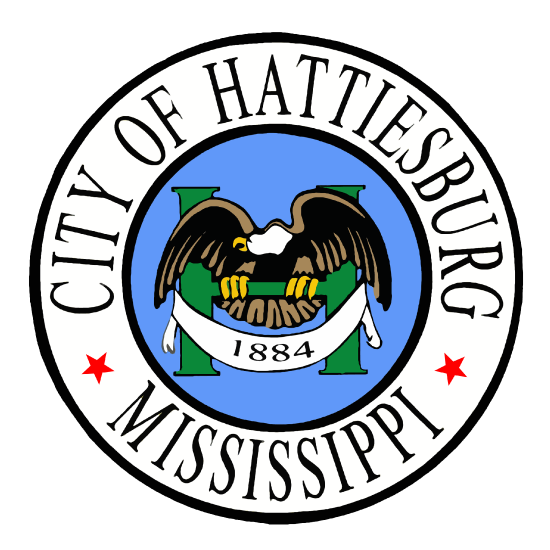Storm Water Management

In accordance with the National Pollutant Discharge Elimination System (NPDES) and authority granted by the Federal Water Pollution Control Act (Clean Water Act), the City of Hattiesburg was issued a Stormwater Permit in 2002, for the discharge of stormwater from the City’s Municipal Separate Storm Sewer System (MS4). The permit was issued to  the City of Hattiesburg by the Mississippi Department of Environmental Quality (MDEQ). The permit covers all areas located within the City of Hattiesburg boundaries. It is a requirement of the Environmental Protection Agency’s (EPA) Phase II Storm Water Rule, which authorizes stormwater discharges from the City’s MS4. The permit also authorizes the discharge of stormwater that is mixed with non-storm water discharges that are in compliance with the permit.
the City of Hattiesburg by the Mississippi Department of Environmental Quality (MDEQ). The permit covers all areas located within the City of Hattiesburg boundaries. It is a requirement of the Environmental Protection Agency’s (EPA) Phase II Storm Water Rule, which authorizes stormwater discharges from the City’s MS4. The permit also authorizes the discharge of stormwater that is mixed with non-storm water discharges that are in compliance with the permit.
The implementation of the City of Hattiesburg Stormwater Program was a requirement of the Stormwater Permit issued to the City. The permit requires the City of Hattiesburg to continue the implementation and enforcement of its Stormwater Management Program (SWMP). The purpose of the program  is to reduce the discharge of pollutants from the MS4 to protect water quality and satisfy applicable water quality requirements of the Clean Water Act.The program is evaluated annually by the Mississippi Department of Environmental Quality (MDEQ). The Stormwater Management Program must be consistent with the requirements found in the City’s Stormwater Permit. Included in the permit are six minimum control measures that guide the direction of the City of Hattiesburg’s Stormwater Management Program:
is to reduce the discharge of pollutants from the MS4 to protect water quality and satisfy applicable water quality requirements of the Clean Water Act.The program is evaluated annually by the Mississippi Department of Environmental Quality (MDEQ). The Stormwater Management Program must be consistent with the requirements found in the City’s Stormwater Permit. Included in the permit are six minimum control measures that guide the direction of the City of Hattiesburg’s Stormwater Management Program:
Public Education and Outreach on Stormwater Impacts
In order to make efforts to control storm water pollution, individual, household, and public behaviors and activities that can generate pollution must be taken into consideration. These behaviors that have the potential to generate storm water pollution include:
- littering
- disposing of trash and recyclables
- disposing of pet-waste
- applying lawn-chemicals
- washing cars
- changing and improperly disposing of motor-oil
- improperly disposing of leftover paint and other household chemicals
It takes individuals to change their behavior and learn proper practices to control pollution make a difference. Therefore it is important to make the public sufficiently aware and concerned about the significance of their behavior for storm water pollution, through information and education, that they change improper behaviors.
Public Involvement/Participation
The City of Hattiesburg cannot be as effective in reducing storm water pollution alone. It takes the participation, partnership, and combined efforts of other groups in the community all working towards the goal to reduce storm water pollution. The point of public involvement is to build community partnerships with interested  citizens and groups, to help spread the message on preventing storm water pollution. This can be done by implementing group activities that highlight storm drain pollution and contribute volunteer community actions to restore and protect local water resources.
citizens and groups, to help spread the message on preventing storm water pollution. This can be done by implementing group activities that highlight storm drain pollution and contribute volunteer community actions to restore and protect local water resources.
Illicit Discharge Detection and Elimination
The objective of illicit discharge detection and elimination (IDDE) component of the program is to locate and eliminate potential and existing non-storm water wastes from entering storm sewers from residential, commercial, municipal, industrial and institutional facilities located within the City of Hattiesburg.
Construction Site Stormwater Runoff Control
Stormwater runoff from construction activities can have a significant impact on water quality. As stormwater flows over a construction site, it can pick up pollutants like sediment, debris, and chemicals which eventually drain to a nearby storm sewer system. The objective of construction site storm water runoff control is to develop, implement, and enforce a program to reduce pollutants in any stormwater runoff from construction activities that result in land disturbance.
Post-Construction Stormwater Management in New Development and Redevelopment
The objective of the post-construction storm water management is the development and implementation of measures used to control the amount of storm water runoff from new developments.
Pollution Prevention/Good Housekeeping for Municipal Operations
The objective of good housekeeping for municipal operations is to ensure that municipalities modify their actions to significantly reduce or eliminate the amount and type of pollution that collects on streets, parking lots, open spaces, parks, and storage and vehicle maintenance areas.

You can help the City of Hattiesburg by identifying and reporting potential sources of stormwater pollution. To report stormwater pollution in your area, call the 601-545-4500.


